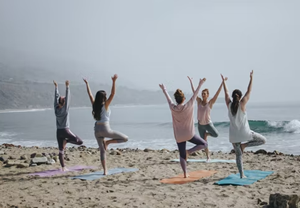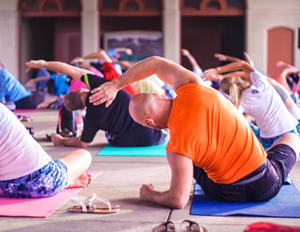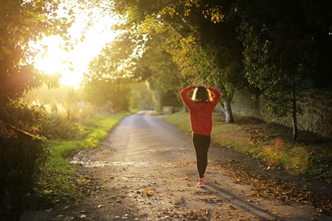by Rev. Racquel Ray, Assoc. Minister (Acting)
A few weeks ago, I stepped on the scale and realized that my weight was heading in the wrong direction. Pandemic isolation, stress, and compounding grief has caused us all to face changes in our routines. For me, I let go of regular physical exams and dental care. I have an excellent primary care doctor. She is very patient with me and encourages me toward wellness. But, through the pandemic, many of our providers’ offices were closed. And I did not want to risk exposure to other ‘pods’ than my work and home social circles. So, I neglected my basic healthcare over the past two years.
I have talked to enough colleagues and congregation members about this to know I am not alone. We often neglect our physical health when we are in times of high stress. Often, the body is neglected when we face hardships. Why is it that on our hardest days we often forget to eat or hydrate? On the most stressful days we forget to rest (or struggle to do so). During the times when we most need to be nurtured, human nature is to do the opposite. Why do we treat ourselves worse on the days when we need the most care?!
 Over the past few months, I have been returning to routine care. Like many of us, that initial primary care appointment was stressful and led to an avalanche of follow-up appointments. Annual screenings, a trip to the dermatologist where I was diagnosed with pre-cancerous cells and have several spots treated with liquid nitrogen, and a new physical therapy routine for elbow tendonitis. I am still facing dental anxiety after experiencing dental nerve damage last summer which led to months of speech therapy for a slur (that is now hard to detect). I want wellness.
Over the past few months, I have been returning to routine care. Like many of us, that initial primary care appointment was stressful and led to an avalanche of follow-up appointments. Annual screenings, a trip to the dermatologist where I was diagnosed with pre-cancerous cells and have several spots treated with liquid nitrogen, and a new physical therapy routine for elbow tendonitis. I am still facing dental anxiety after experiencing dental nerve damage last summer which led to months of speech therapy for a slur (that is now hard to detect). I want wellness.
This is ‘too much information’ for a pastor to share with the congregation. Normally, we don’t disclose our personal stories or struggles so much. But, in this season as we try to redevelop ourselves as a community it is important to see that we have all been deeply affected by the past two years. We have faced tremendous loss and grief. We have lost loved ones. We have lost our jobs or transitioned jobs. We have watched our children regress academically. And we have all endured a cultural trauma which has left many of us disoriented and yearning for normal routines.
 Our bodies hold this trauma. We hold the visceral stress of the past within our bodies; the aches and pains, the inflammation, the muscles memories become compartmentalized and parked within our physical beings. Wellness requires us to let it out. Wellness requires awareness, sharing, and seeking support. Wellness requires action!
Our bodies hold this trauma. We hold the visceral stress of the past within our bodies; the aches and pains, the inflammation, the muscles memories become compartmentalized and parked within our physical beings. Wellness requires us to let it out. Wellness requires awareness, sharing, and seeking support. Wellness requires action!
Wellness is about finding equilibrium between all of our aspects of being physical, financial, relational, and Spiritual. Physical health is about a healthy balance of rest and activity, nutrition and hydration, work and play. Financial health is about finding a balance between security and enjoyment. Relational health is about finding a balance between ourselves and others. Spiritual health is about finding a balance between ourselves and the Divine. Wellness is a balance between our own individual being and our place within our communities; being fully present in ourselves and the spaces we inhabit.
 Our bodies are Divinely created in the character and image of God. Our bodies are therefore sacred. Our body is the physical manifestation of the Divine within us. It is how we interact with the world around us. It is how we join the congregation as the larger ‘body of Christ’. In the Communion feast, it is our body that abides with the Body of Christ the broken bread and the spilled cup. Our bodies are the sacred vessels that hold the Body of Christ. And it is our bodies that carry the sacred flame of the Holy Spirit within.
Our bodies are Divinely created in the character and image of God. Our bodies are therefore sacred. Our body is the physical manifestation of the Divine within us. It is how we interact with the world around us. It is how we join the congregation as the larger ‘body of Christ’. In the Communion feast, it is our body that abides with the Body of Christ the broken bread and the spilled cup. Our bodies are the sacred vessels that hold the Body of Christ. And it is our bodies that carry the sacred flame of the Holy Spirit within.
 God became flesh in the body of Jesus of Nazareth. God cared for the body of Elijah ensuring he was fed by ravens and the widow. The Israelites were fed in the wilderness by bread from Heaven. Mary gave of her body as a vessel to the Holy. Jesus used his body in ministry to touch the leper and the blind for healing. It is clear in the scriptures that the human body matters. It was the body of Jesus that was broken, abused, and sacrificed – and resurrected.
God became flesh in the body of Jesus of Nazareth. God cared for the body of Elijah ensuring he was fed by ravens and the widow. The Israelites were fed in the wilderness by bread from Heaven. Mary gave of her body as a vessel to the Holy. Jesus used his body in ministry to touch the leper and the blind for healing. It is clear in the scriptures that the human body matters. It was the body of Jesus that was broken, abused, and sacrificed – and resurrected.
The Apostle Paul writes in the first letter to the church in Corinth, “All things are lawful for me, but not everything is beneficial to me. Everything is lawful but not everything is edifying” (1COR 10:23). I’m reminded that though we are able, as Christians, to eat what we like and use our bodies as we wish, we must also be mindful of what benefits us. What serves our bodies well and what does not? Wellness is about knowing what is beneficial.
 I really appreciate the United Church of Christ’s covenant of care with its ministers. In the ministerial code, ministers are encouraged to care for all creation including ourselves. We must maintain a basic understanding of mental health and wellness, practice self-care and life balance among other wellness examples. My colleagues and I will often encourage each other to wellness, “How are you taking care of yourself this week?” or “I’m glad you’re taking some vacation time.”
I really appreciate the United Church of Christ’s covenant of care with its ministers. In the ministerial code, ministers are encouraged to care for all creation including ourselves. We must maintain a basic understanding of mental health and wellness, practice self-care and life balance among other wellness examples. My colleagues and I will often encourage each other to wellness, “How are you taking care of yourself this week?” or “I’m glad you’re taking some vacation time.”
I wonder how this collaboration toward wellness can blossom in our congregation. I want a Wellness Ministry. I would love a community where we encourage each other toward health, balance, vibrance, and wellness. As part of our care of creation we ought to care for each other and our wellness as individuals and as a community. Can we have Wellness Wednesdays? Can we have a walking group? Can we host a Yoga Class? Can we create a swim club at the YMCA? We are known as the ‘rainbow doors church’. Some call us the ‘happy church’. Can we also be the ‘healthy church’?



